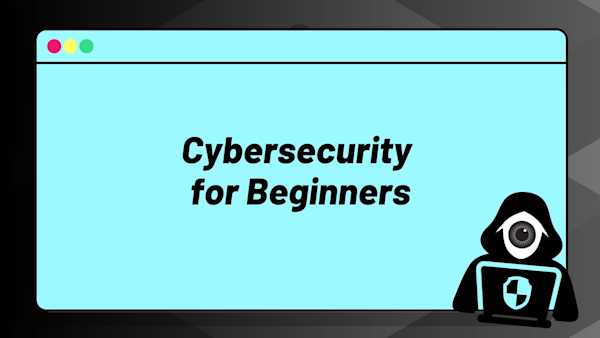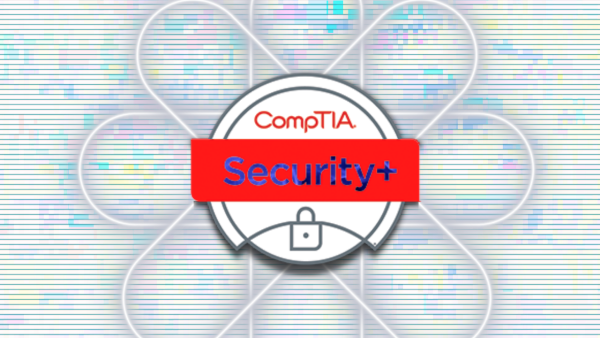What you'll learn
- How to launch your career in Cyber Security from scratch
- Have the skills and understanding to confidently apply for Cyber Security jobs
- Learn the entire Cyber Security ecosystem
- Become an Incident Response Analyst, the first responders to a cyber attack
- Learn to identify social engineering and protect against it
- Become a Risk Analyst, the tacticians that perform regular assessments of a company's cyber security systems
- How to develop effective end-point protection and network security systems
- Become a Penetration Tester / Ethical Hacker, the mercenaries that design, simulate, and execute attacks on enterprise networks to identify vulnerabilities
- Understand how hackers track you and your associates online
- Become a Forensic Analyst, the detectives that investigate breaches and solve virtual crimes
- Protect yourself online using advanced anonymity and privacy techniques
- Master Cyber Security best practices and techniques to become a Top 10% Cyber Security Engineer
There's no time to waste. There's more and more valuable data and assets online every day. And many companies don't have the proper defenses set up to protect their digital assets. So hackers are constantly on the lookout for new targets to attack.
That's why the cybersecurity sector is growing so rapidly and why this course is focused on efficiency.
So that you learn the exact techniques and tools you need to know to help companies (or yourself) protect and defend digital assets from these black hat hackers. The sooner we can teach you this, the sooner you'll be able to get hired as a Cyber Security Expert.
Graduates of Zero To Mastery are now working at Google, Tesla, Amazon, Apple, IBM, Uber, Facebook, Shopify + other top tech companies.
They are also working as top freelancers getting paid while working remotely around the world.
This can be you.
By enrolling today, you’ll also get to join our exclusive live online community classroom to learn alongside thousands of students, alumni, mentors, TAs and Instructors.
Most importantly, you'll be learning from a senior industry professional that has actual real-world experience working on security for large companies and websites/apps with millions of users.
What's the difference between this Cybersecurity Bootcamp and the Ethical Hacking Bootcamp?
The key to success is to keep learning and improving.
Fortunately for you, we provide everything you'll need to become a Top 10% Cybersecurity Engineer, including these two bootcamps.
Both of these bootcamps provide excellent training to become a Cyber Security Expert. They can be taken in any order. But they're each focused on different aspects of security.
The key is this:
-
If you're interested in the offensive side of cybersecurity, such as understanding how to hack and compromise a system, then start with the Ethical Hacking Bootcamp.
-
If you're more interested in the defensive side of cybersecurity, such as securing and preventing attackers from accessing systems, then take this Cybersecurity Bootcamp.
If you just want to get hired in the cybersecurity field then start with this course. Most Cyber Security Engineer jobs will need you to have these defensive skills first and foremost.
Why Should I Learn Cybersecurity?
Whether you're a complete beginner looking to become an Ethical Hacker, someone looking to learn about securing computer systems, or a programmer looking to advance your career by adding an in-demand skill to your toolkit, this cyber security course is for you.
In the world of cyber security there is a constant battle between good and evil.
There are bad actors all over the world launch cyberattacks every day aimed at extorting money, damaging a person or business, or accessing and stealing sensitive information.
As a Cyber Security Engineer you get to be at the forefront of fighting this war against these bad actors. And because digital assets are so valuable for companies, they will pay huge salaries to those able to fight for them.
With more and more cyberattacks happening each day, Cyber Security Engineers have become one of the most in-demand jobs in the world.
This cybersecurity course will even teach you the information needed to specialize in a number of areas including:
- Incident Response Analyst - the first responders: be at the forefront of the battle by identifying breaches and containing them as quickly and effectively as possible.
- Risk Analyst - the tacticians: proactively perform regular assessments of the cybersecurity landscape and recommend improvements to prevent a breach from occuring in the first place.
- Penetration Tester / Ethical Hacker - the mercenaries: design, simulate, and execute attacks on enterprise networks and systems with the intent to identify vulnerabilities so that they can be addressed before a hacker utilizes them for nefarious purposes.
- Forensic Analyst - the detectives: investigate breaches by tracing digital footprints with the goal of recovering stolen data and other digital assets, and figure out how the breach happened.
With so many opportunities available in the cybersecurity sector, you're guaranteed to have an exciting and high paying career.
Still not sure? Here are Aleksa's (your Cybersecurity instructor) Top 5 Reasons To Learn Cyber Security.
What if I don't know programming?
Good news, you don't need to know any programming for this course. Your instructor will teach you everything you need to know.
Here's What This Cyber Security Bootcamp Covers
This course, like all Zero To Mastery courses, will be constantly updated with new lectures and resources as the cyber security landscape changes.
This will be your go-to place to find the latest cybersecurity best practices and resources anytime in the future.
1. Cyber Security Fundamentals
A good foundation is needed for success. So you'll start with the basics of what cyber security is, the history of cyber security, and what it really means to be a Cyber Security Engineer.
You'll also learn the lingo and terminology used in the real world such as Red Teams, Blue Teams, Black Hat Hackers, and Digital Assets.
2. Understanding Hackers - The Biggest Threat
In your new career you'll be fighting against hackers. So it's necessary to understand how they think, as well as the processes and techniques they use to attack. You'll dive into the mind of hackers so that you can think like them and anticipate their moves.
3. Security Bugs & Vulnerabilities
In a perfect world, your systems have no security bugs. But we don't live in a perfect world. There are always bugs and vulnerabilities. If there weren't, then cyber security wouldn't be such an in-demand field.
It's important that you understand what a security vulnerability is and the many types of vulnerabilities that can occur.
You'll also learn about my personal favorite subject, Buffer Overflows.
Buffers are memory storage regions that hold data temporarily while it is being transferred from one location to another. That's all fine and dandy, but unfortunately hackers can exploit overflow buffers, which can trigger a response that damages files or exposes private information. It's a serious and common issue that you'll learn to identify and protect against.
4. Social Engineering
Every system in the world has a common, virtually unavoidable vulnerability: people.
In other words, social engineering = hacking people.
That's right. Hackers work to manipulate people by engineering situations where they let their guard down and provide the hackers with information that allows them to breach an otherwise strong system.
Ever get one of those scam emails where the emailer pretends to be someone you know? That's a basic attempt by a hacker at social engineering.
Social engineering can be done to gain access to a system without any software bug or vulnerability being present. For example, by delivering a payload through phishing links and making the person execute it without knowing that it's malicious.
5. End-Point Protection
In this section you'll take a long, hard look at how to protect one of your most vulnerable pieces of technology: end point devices, like your laptop and cell phone.
Everything from the basics like installing anti-virus and using a password manager, to more involved techniques that will protect you from advanced hackers. This section will help shore up your defenses.
6. Network Security
Your network is your castle, and like any good castle it should be protected by all sorts of defenses.
It is absolutely essential to have a secure network.
In this section you'll learn about using methods such as firewalls, and tools such as Nmap, Nessus, and Routersploit to discover any vulnerabilities in your network and its devices, including how to patch and secure your network.
7. Advanced Cyber Security Strategies
This section is where the rubber meets the road. You'll learn how to implement advanced cyber security strategies and techniques, including:
- Protect & Recover Strategy
- Endpoint Protection Strategy
- Application Centric Strategy
- Identity Centric Strategy
- Data Centric Strategy
- Attack Centric Strategy
8. Cyber Tracking
How are we tracked online? For anyone entering the cybersecurity field, one of the most important things you need to master is how tracking works on the internet. This includes things like how websites and apps track people, and how other people can track you.
9. Anonymity & Privacy
Sometimes the best defense is a good offense. This section will teach you how to make yourself anonymous and increase privacy on the internet to decrease vulnerability to hackers, including methods such as a VPN or proxy, and browsing through Tor instead of regular browsers such as Google Chrome.
You'll also learn alternative, more secretive tools that can automate the process of anonymizing and privatizing your presence online.
10. Bonus Section - Ethical Hacking
One of the most in-demand specializations within Cyber Security is an Ethical Hacker (also known as a Penetration Tester).
These professionals simulate and execute attacks on enterprise networks and systems with the intent to identify vulnerabilities so that they can be addressed before a hacker utilizes them for nefarious purposes.
This bonus section is part of our Ethical Hacking Bootcamp that teaches you the advanced techniques needed to work in this in-demand field.
Plus this course provides you with tons of bonus resources, cheatsheets & much more!
What's the bottom line?
This course is not about making you just follow along so that when you are done with the course you don’t know what to do other than watch another tutorial. No!
This course will push you and challenge you to go from an absolute beginner in Cyber Security to someone that is in the top 10% of Cyber Security Engineers 💪.
And you have nothing to lose. You can start learning right now and if this course isn't everything you expected, we'll refund you 100% within 30 days. No hassles and no questions asked.
When's the best time to get started? Today!
There's never a bad time to learn in-demand skills. But the sooner, the better. So start learning cyber security today by joining the ZTM Academy. You'll have a clear roadmap to developing the skills to build your own projects, get hired, and advance your career.
Join Zero To Mastery Now




